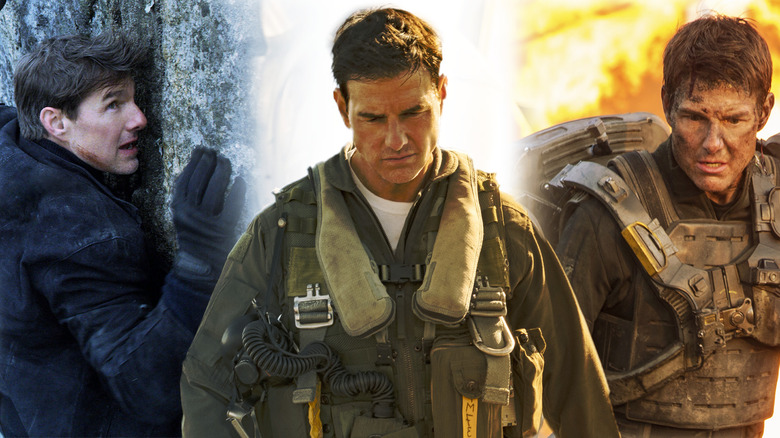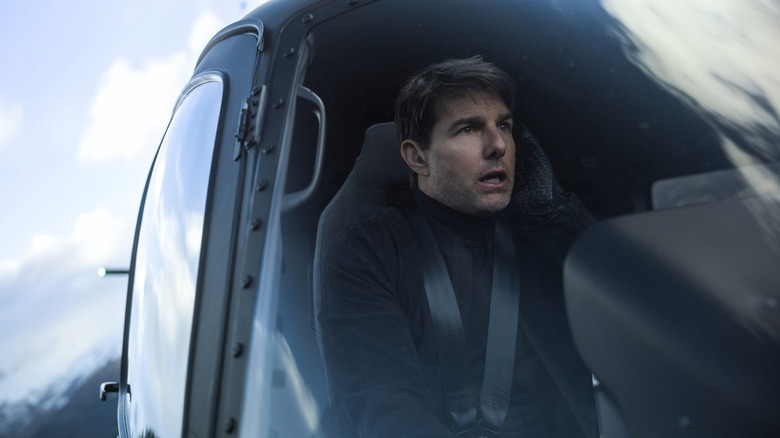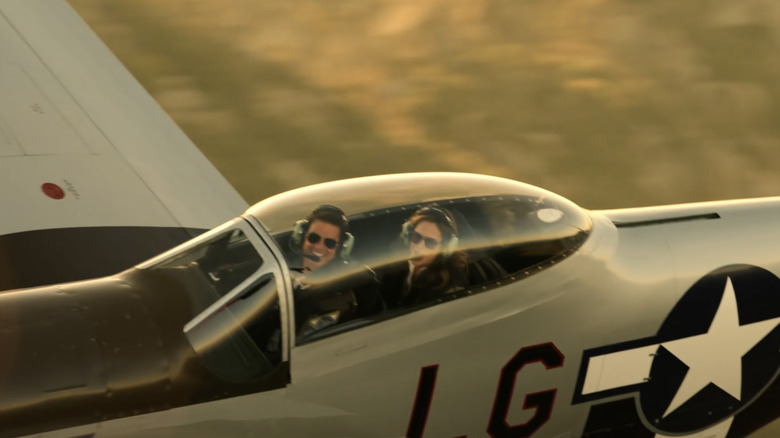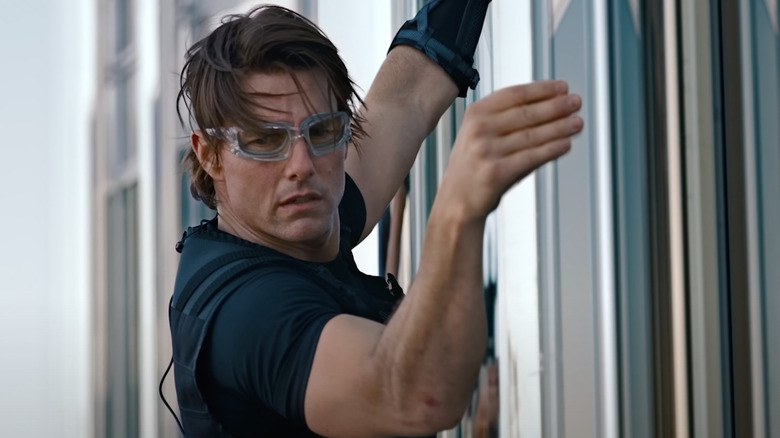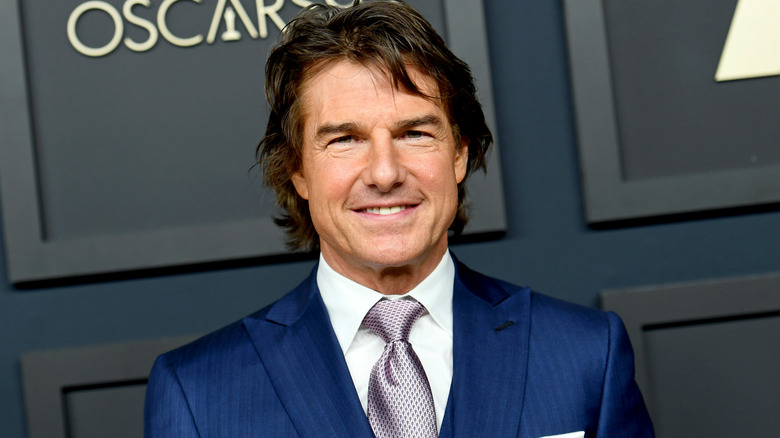Tom Cruise Is Hollywood's Last Great Action Star (And We're Doomed Without Him)
These days, whenever Tom Cruise comes up, it's expected that the Oscar-nominee will be labeled as Hollywood's "last movie star." There's certainly some truth to that title, especially as our perpetually online culture becomes more obsessed with fictional characters and IPs rather than performers and personalities. While Cruise is one of the few surviving Hollywood stars (recent box office receipts confirm that Tom Hanks and Julia Roberts are still partial draws) it seems more appropriate to label him as Tinseltown's last great action star.
Truthfully, Cruise's career is more complex than that, but the anxiety-inducing verson who prowled the seedy streets of L.A. in "Collateral" is a product of another era. So is the Cruise who grappled with the loss of beauty, life, and pitfalls of excess in "Vanilla Sky." He hasn't delivered a non-action role in years — his last dramatic, grounded feature being 2017's "American Made," an effort by Doug Liman which still featured frantic aerial action sequences – and the only shade of Cruise that persists today is his action hero persona.
Still, action Cruise keeps ascending to new heights, and we're better for it. In a sea of CG-heavy science-fiction films, Cruise is the only actor in Hollywood who doesn't fall into a repetitive slump with his franchise(s), consistently pushes boundaries, puts his life on the line for our entertainment, and manages to have his cake and eat it too.
What's the result of this wild cocktail of a human? An unprecedented, unparalleled level of freedom. While modern Hollywood "stars" are defined by their lofty endorsement deals and social media followers, Cruise's star-power is assessed and emboldened by his ability to do whatever he wants. This recipe for success, of course, starts with his innate ability to always assess what audiences want, without comprising his needs.
Mission: Impossible doesn't define Tom Cruise
As an action star, Tom Cruise has never let his franchises define him. Since joining the "Mission: Impossible" franchise in 1996, Cruise has delivered countless non-franchise, original action films — and they do reasonably well ("Edge of Tomorrow," "Knight and Day," and "Oblivion" all raked in over $250 million worldwide). While those numbers may pale in comparison to the hefty receipts of his spy thrillers, what particularly makes Cruise the last ambassador of Hollywood action cinema is how he refuses to let "Mission: Impossible" bog him down.
Each "Mission: Impossible" film is a freeing, expansive expression about whatever Cruise wants to do. It's the cinematic equivalent of a freestyle. While there are central themes and plotlines at the heart of "Mission: Impossible," the action-thrillers are never at the mercy of modern franchise expectations such as spin-offs or expanded universe trappings. There are no quotas to be met. No future stories to set-up. They're canvases for Cruise to share his latest death-defying stunts. In an interview with Vanity Fair's "Little Gold Men" podcast, franchise star Rebecca Ferguson admitted that the "Mission: Impossible" films are largely improvised, with Cruise calling the shots.
Unlike Cruise, other modern Hollywood action stars are only products of their franchises. They only operate as extensions of the characters they play within their cinematic playgrounds. Marvel's Anthony Mackie said as much at the London Comic Con. "There are no movie stars anymore," the actor explained in his viral response. "Like, Anthony Mackie isn't a movie star, the Falcon is a movie star."
People absolutely do care about what Sam Wilson, now Captain America, does in the Marvel films. However, no one cares what Ethan Hunt is doing. They just want to see bombastic action, with Cruise at the helm.
Tom Cruise blurs the line between work and fun
It's important to remember that "Mission: Impossible," aka the franchise itself, is still a genuine draw for audiences. However, "Mission: Impossible" is synonymous with Tom Cruise, and the same can't be said for other contemporary action heroes.
For instance, Tom Holland is Spider-Man, but "Spider-Man" isn't Tom Holland. Chris Pratt and Bryce Dallas Howard gracefully co-lead "Jurassic World," one of the biggest action spectacles of the last decade, but they weren't the draw that compelled audiences to show up opening weekend. The dinosaurs were.
Cruise, on the other hand, is the defining part of every franchise he involves himself in. He knows that, and he leverages his power to show the world what he's capable of. He's not an actor in his franchises — rather, "Mission: Impossible" and "Top Gun" are extensions of him as a personality. They're opportunities for the fanbase to grow closer to Cruise as a personality. If "Mission: Impossible" is a vehicle for Cruise to fulfill whatever death wish he holds, then "Top Gun" is how the star expresses his love for flying. In the recent sequel, which he resisted making for over two decades, the actor flew his own P-51 Mustang for the film's final aerial shots. For him to do supplemental work, i.e flying, is nothing short of remarkable, but for him to bring his own gear? Not only does that equal full control of how he's portrayed on-screen, but also points toward his intentional blurring between his professional and leisurely life.
The actor, in recent years, is always seeking projects and ideas that genuinely compel and make him excited, allowing him an opportunity to express curiosity. Curiosity may kill the cat, but for Cruise, that's a welcome challenge.
Tom Cruise can do whatever he wants and he knows it
For all his quirks and signature mannerisms, is there anything more quintessentially Cruise than a lust for death-defying stunts? For the last two decades, Cruise has become obsessed with the prospect of stunt work, engulfing himself fully in the process. He climbed the Burj Khalifa — the tallest building in the world — for his fourth "Mission: Impossible" film, a feat that still boggles audiences a decade later.
As one of the most bankable stars in the world, it can be difficult to keep Cruise safe, especially as he's pulling off chaotic feats. But as the steward of his films, he makes it a point to make sure that everyone, both on and off the set, sees his vision: only Cruise is in charge. While speaking with Desus & Mero, Matt Damon opened up about how he has no qualms letting professionals do dangerous stunts, unlike Tom Cruise. The "Bourne" actor detailed how Cruise's plan to run down the Burj Khalifa in "Ghost Protocol" was shot down by the film's safety coordinator because it was too dangerous. The result? Cruise hired another safety coordinator who obliged with his vision.
While it's commendable when other stars do their own stunts (we're looking at you Charlize Theron and Keanu Reeves), they're typically not involved in the creative process. Every time a stunt is commissioned in a Cruise film, it revolves around him and his expectations. As much as each stunt is an opportunity to push his capabilities as a human, it's also a method for him to tell the most compelling visual narrative, with Cruise explaining to Graham Norton that doing his own stunts, in his words, "Allows [him] to put cameras where you are normally not able to."
Tom Cruise always gets a blank check
While Hollywood continues to ease spending in the wake of the COVID-19 pandemic and rapid inflation, Tom Cruise truly does whatever he wants, no matter the cost. At least stateside, Cruise is the only superstar who still has unparalleled freedom in a landscape that's tightening budgets left and right. While corners are being cut, Cruise is able to get a one on one with Paramount Pictures' CEO and demand a larger budget for "Mission: Impossible Dead Reckoning Part One," a film that is already budgeted at $290 million. One of Cruise's most audacious demands? Adding a last-minute submarine appearance to the seventh entry in the "Mission" franchise.
The truth is, even executives know they shouldn't say no to Cruise, with the THR report pointing out that Tom knows what he's worth, and the corporate bigwigs know how much he rakes in. Even though he's consistent with his pull, brass still need to be reminded of Cruise's powers. The actor sat on "Top Gun: Maverick" for nearly two years, refusing to let Paramount Pictures release the long-awaited in a non-theatrical manner. The result? A global cume of over $1.4 billion and Paramount's highest-grosser to date. Turns out that listening to Cruise is one of the best ideas any studio can do.
Which is why Cruise can add a last-minute submarine to "Mission: Impossible 7," climb the world's tallest building with few safety protocols in place, and compel a studio to let him jettison off to space. Hollywood will continue to release bombastic action flicks well after Cruise, but when his reign ends, the era of action stars will truly be over.
